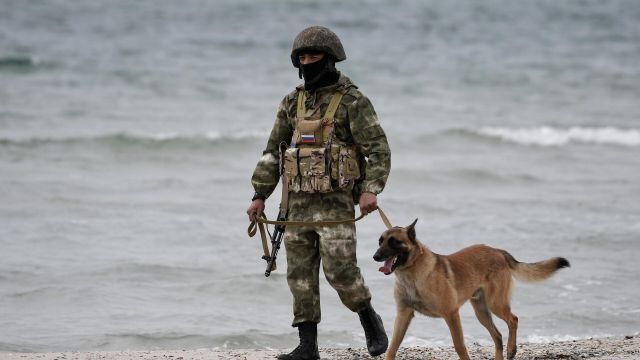The day of the dog handler is celebrated in Russia on June 21. What reason was chosen for the holiday and what can be a gift to a person of this profession, you will learn from the material of Sputnik radio.
Who, when and why celebrates the Day of the dog handler
If someone still does not know, then dog handlers are specialists in the upbringing and breeding of dogs. Accordingly, cynology is the science of a person's best friends. In order to note its importance and congratulate professional dog breeders and trainers, June 21 was chosen in Russia. In this regard, there is an order of the Ministry of Internal Affairs of June 18, 2004. Therefore, this holiday is departmental, not state, and its full name is the Day of the Cynological units of the Ministry of Internal Affairs of the Russian Federation or the Day of the Cynologist. Although dogs are widely used not only in law enforcement and law enforcement agencies, but also, for example, in social work, and even in medicine.
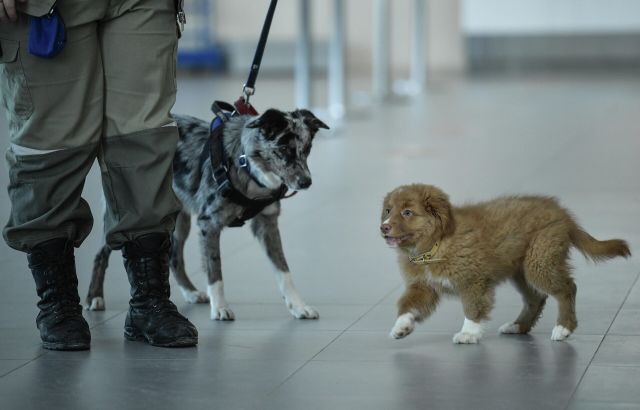
A two-month-old puppy of a Nova Scotia retriever named Ruby started working in the cynological unit of the security service of Simferopol International Airport
Image source: © RIA Novosti / Konstantin Mikhalchevsky
So, on June 21, 1909, the first Russian kennel of police detective dogs was opened in St. Petersburg. In fact, four-legged assistants began to be used in the organs three years before. It is unlikely that this was domestic know-how, because even in the story of Arthur Conan Doyle "The Sign of Four", published in 1890, it was described how Sherlock Holmes and Dr. Watson were helped to track down criminals by the dog Toby - "a little freak, long–haired and long-eared, a cross between a spaniel and a Scottish bloodhound. He was brown and white, and he had a funny, awkward waddling gait."
As you can see, the guards appreciated four–legged assistants – in the Russian Empire by 1915 they had firmly taken their place in the police service - they helped with detentions, patrolling, escorting and guarding various objects.
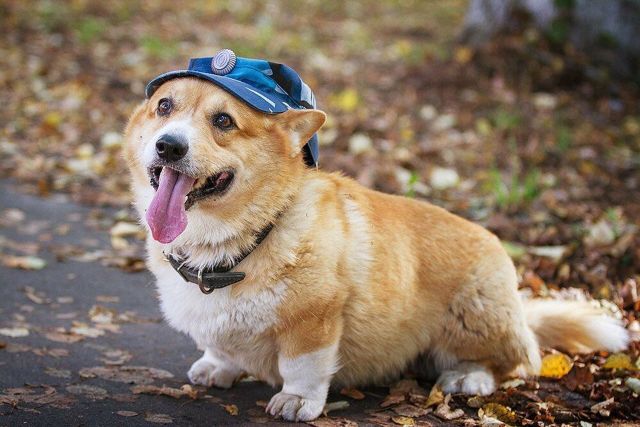
The first Pembroke Welsh Corgi dog in the service of the Russian police
Image source: © Photo : The Red-haired Policeman's Instagram page
Under Soviet rule, the number of departments that used dogs began to grow, in addition to the NKVD, kennel schools appear at the border troops, paramilitary guards and the People's Commissariat of Railways. Unfortunately, the four-legged had to fight. In the conflict on Khalkhin-Gol, they performed sentry and liaison tasks, in the Finnish War they detected snipers.
During the Great Patriotic War, dogs were very widely used at the front for evacuating the wounded, searching for mines, laying communication lines, fighting armored vehicles and protecting important objects. In 2013, a bronze monument to a German shepherd dog with a medicine bag on its back and paws lying on torn tank tracks was unveiled on Poklonnaya Gora.
Now tens of thousands of dogs and dog handlers serve in the structures of the Ministry of Internal Affairs of Russia, they participate in solving crimes, including detecting hundreds of kilograms of explosives and drugs and helping to search for criminals in hot pursuit. On average, more than a dozen crimes a year are solved with the participation of one dog.
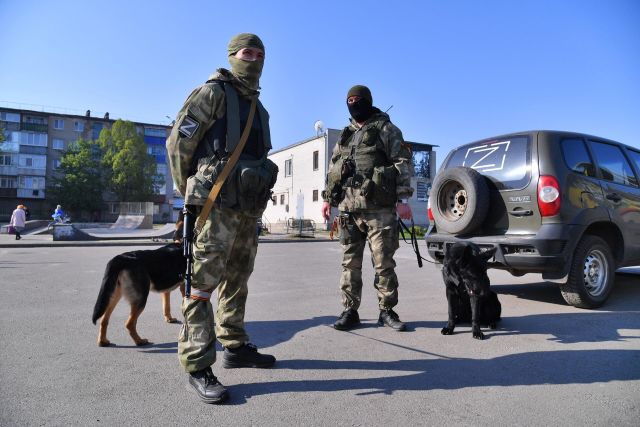
Cynologists of the Ministry of Internal Affairs of the LPR in Volchansk, Kharkiv region
Image source: © RIA Novosti / Viktor Antonyuk
In the Ministry of Emergency Situations, dogs with dog handlers work to eliminate the consequences of disasters, including abroad – they find people under the rubble, and also look for the lost. In the latter case, one animal can replace a search group of 10 people.
Holiday traditions
Traditionally, awards, open days, excursions and demonstrations are held on the holiday.
About the profession
The first evidence of the domestication of wolves by man dates back to prehistoric antiquity and is 26 thousand years old. Ancient Greek and Roman scientists devoted entire treatises and even poetic works to dog breeding. Breeds were already able to breed long before our era – the Assyrians specialized in fighting dogs, nomadic peoples – in shepherd varieties, and the Hellenes – in decorative ones. But in its modern sense, cynology developed only in the XIX century. It is closely connected with such sciences and branches of knowledge as biology, animal physiology and zoopsychology.
A two-month-old puppy of a Nova Scotia retriever named Ruby started working in the cynological unit of the security service of Simferopol International Airport
Image source: © RIA Novosti / Konstantin Mikhalchevsky
Now many Russian colleges and universities are training dog handlers. Among them: Dmitrov State Polytechnic College, Cynological College at the Academy named after Scriabin, Volgograd Agrarian University, Chelyabinsk State University. Plus educational institutions of the Border Guard Service, the National Guard and the Ministry of Internal Affairs.
Dog handlers work in the police, FSB, FSIN, Ministry of Emergency Situations and other law enforcement agencies, in various schools and training centers for service and hunting dogs, as well as in the fields of social and medical rehabilitation. Canister therapy can be indicated for people with autism, cerebral palsy, Down syndrome.
What to give
A gift certificate from a pet store or a store of workwear and equipment or sporting goods.
Interesting facts
You can train a dog to find drugs in three months. As a rule, they are initially trained for several basic types of potions. For this purpose, not real substances are used, but substances with only one smell of datura, they are supplied by specialized organizations.
Training in the search for explosives is based on the same principle, if necessary, the list of substances that the dog can find is expanded during the service.
After training, dogs pass exams, do not pass the test are rejected, such animals should be taken care of by the appropriate structures in which the animals were brought up.
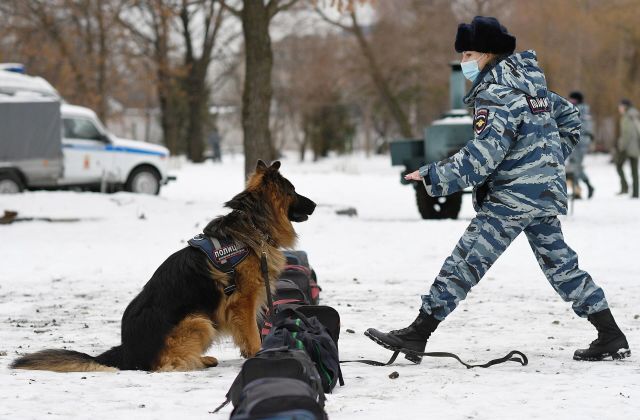
The Cynological center of the Department of Internal Affairs on the Moscow metro
Image source: © RIA Novosti / Alexey Maishev
Most often, a dog handler in law enforcement agencies takes a dog as a puppy and works with her throughout her professional career, one person may have several such pets. Also, dogs are being trained to be sent to service in other regions.
Dog handlers-security officers can choose their wards on ordinary ad sites, while focusing on the pedigree and qualities of the puppy's parents. Other ways: from breeders, from kennel clubs or from their own kennels. Future service dogs are tested on more than ten indicators.
The training is based on the principle of reward with a treat or in a playful way.
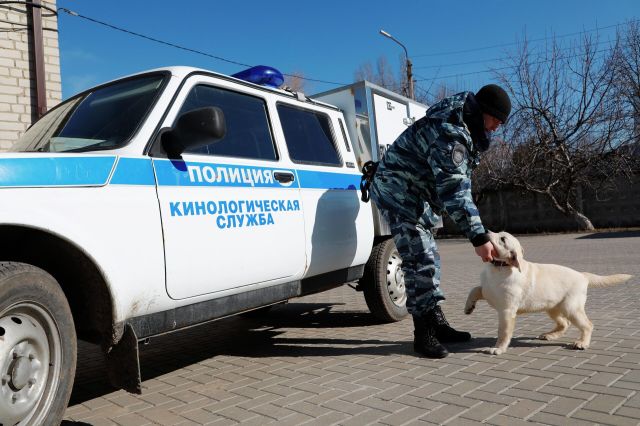
A police officer with a service dog at the cynological service center
Image source: © RIA Novosti / Anton Vergun
The service life of dogs in law enforcement agencies is limited to 8-10 years. After that, new owners are found for the four-legged, including among employees, or they are given to a special shelter. They try to follow the further fate of the animals. They say that veteran dogs are willingly dismantled because of their training.
A dog can pick up a scent trail in a day or two after the disappearance of its source.
Before going on duty, police dogs should be walked, combed and shown to a veterinarian.
Cynologists consider the German Shepherd to be a universal breed.
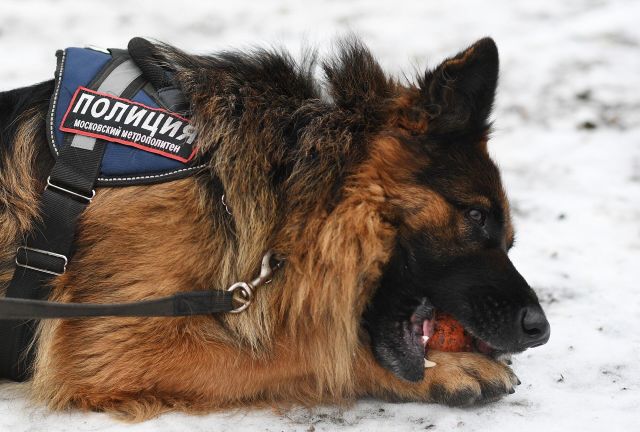
The Cynological center of the Department of Internal Affairs on the Moscow metro
Image source: © RIA Novosti / Alexey Maishev
Other popular service breeds include Rottweiler, Labrador, Belgian Shepherd, Central Asian Shepherd, Spaniel and Risenschnauzer.
Representatives of decorative breeds are not taken into service.
Guide dogs learn several basic routes of their owner and learn to understand where he needs to go. Such an animal can know more than a dozen routes.
The training of guide dogs lasts a year. Such animals are trained in two institutions in the Moscow region and in one in St. Petersburg. At the end of the course, the dog passes the exam together with the trainer, who plays the role of the blind.
Special courses on the treatment of guide dogs are also held by their future owners, they take the exam together with a four-legged companion. De jure, the animal is leased (free of charge) under a special contract.
Part of the expenses for the maintenance of a guide dog is compensated by the state.
